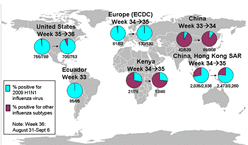2009 H1N1 Flu: International Situation Update
September 11, 2009, 6:00 PM ET
This situation report provides an update to the international situation as of September 11th, 2009. As of September 6th, the World Health Organization (WHO) regions have reported over 277,607 laboratory-confirmed cases of 2009 H1N1 influenza virus (2009 H1N1) with at least 3,205 deaths, which is an increase of over 23,401 cases and at least 368 deaths since August 30th. The laboratory-confirmed cases represent a substantial underestimation of total cases in the world as many countries focus surveillance and laboratory testing only on persons with severe illness. The 2009 H1N1 influenza virus continues to be the dominant influenza virus in circulation in the world. Decreasing trends in disease due to 2009 H1N1 continue to be reported in most of South America and Australia. In contrast, more African countries have reported their first laboratory confirmed cases.
Selected Highlights
- The 2009 H1N1 influenza virus is the predominant influenza virus in circulation worldwide.
- The epidemiology of the disease caused by the 2009 H1N1 influenza virus in the Southern Hemisphere is very similar to that described in the United States this past spring.
- There have been no significant changes detected in the 2009 H1N1 influenza virus isolated from persons in the Southern Hemisphere as compared to viruses isolated from persons in the Northern Hemisphere.
- In August, a White House report was prepared by the Department of Health and Human Services (HHS) in coordination with the Office of the Director for National Intelligence (ODNI) and the Department of State (Dos) and describes the characteristics and impact of 2009 H1N1 influenza A virus in the Southern Hemisphere. The full report can be accessed by the link provided in the Reports and Publications section below.
International Resources for 2009 H1N1 Information
Health Organizations
- World Health Organization (WHO)
- ECDC (European Centre for Disease Prevention and Control)
- H2P (Humanitarian Pandemic Preparedness)
- Public Health Agency of Canada
World Health Organization (WHO) Regional Offices
- AFRO (WHO Regional Office for Africa)
- AMRO (WHO Regional Office for the Americas) / PAHO (Pan American Health Organization)
- EMRO (WHO Regional Office for the Eastern Mediterranean)
- EURO (WHO Regional Office for Europe)
- SEARO (WHO Regional Office for South-East Asia)
- WPRO (WHO Regional Office for the Western Pacific)
Travel and 2009 H1N1 Flu
Human cases of 2009 H1N1 flu virus infection have been identified in the United States and several countries around the world. For information on 2009 H1N1 flu and travel, see the CDC H1N1 Flu and Travel website.
Reports and Publications
- White House Report on 2009 H1N1 in the Southern Hemisphere
Issued August 2009 – This White House report was prepared by the Department of Health and Human Services (HHS) in coordination with the Office of the Director for National Intelligence (ODNI) and the Department of State (Dos) and describes the characteristics and impact of 2009 H1N1 influenza A virus in the Southern Hemisphere. - ECDC Interim Risk Assessment Influenza A (H1N1) 2009 Pandemic
Issued July 30, 2009 - This document provides an interim risk assessment of novel H1N1 flu in Europe prepared by ECDC. - World Health Organization Weekly Epidemiological record – Issued July 24, 2009
This document by WHO provides updates on the international novel H1N1 flu situation. - MMWR – Update: Novel Influenza A (H1N1) Virus Infection – Mexico, March-May, 2009 – Issued June 5, 2009 / Vol. 58 / No. 21.
This Morbidity and Mortality Weekly Report describes the novel influenza A (H1N1) outbreak in Mexico from March-May, 2009. - MMWR – Update: Novel Influenza A (H1N1) Virus Infections – Worldwide, May 6, 2009 – Issued May 8, 2009 / Vol. 58 / No. 17.
This Morbidity and Mortality Weekly Report describes worldwide novel influenza A (H1N1) infections as of May 6, 2009.
Get email updates
To receive weekly email updates about this site, enter your email address:
Contact Us:
- Centers for Disease Control and Prevention
1600 Clifton Rd
Atlanta, GA 30333 - 800-CDC-INFO
(800-232-4636)
TTY: (888) 232-6348 - Contact CDC-INFO
